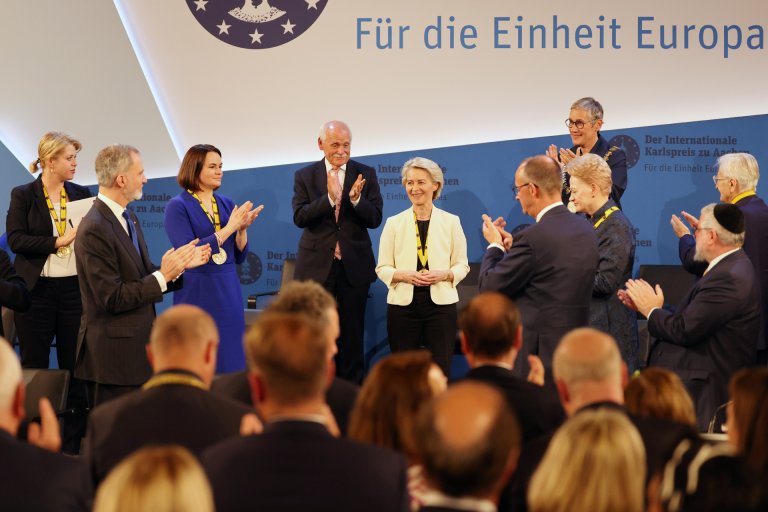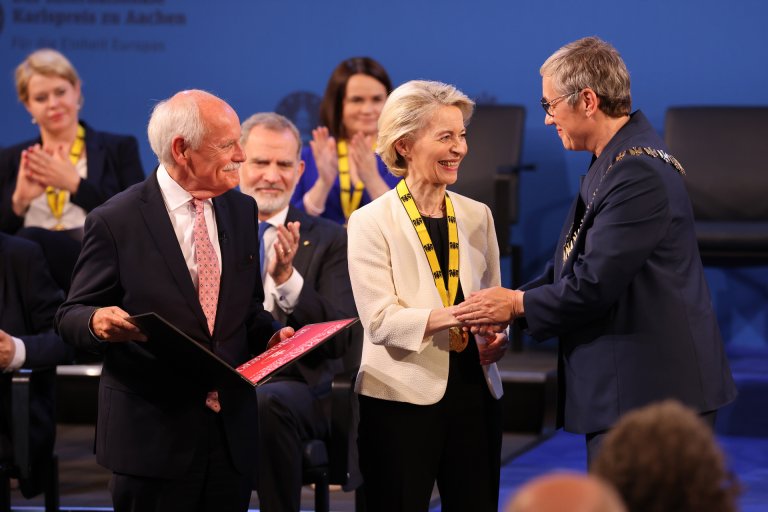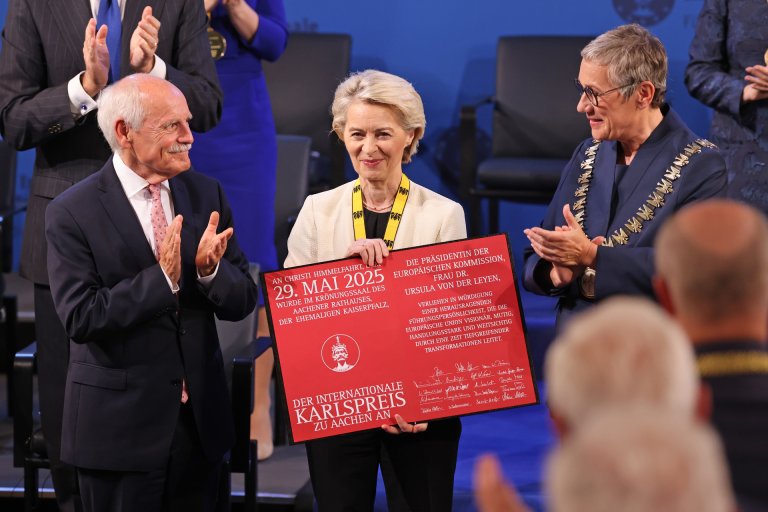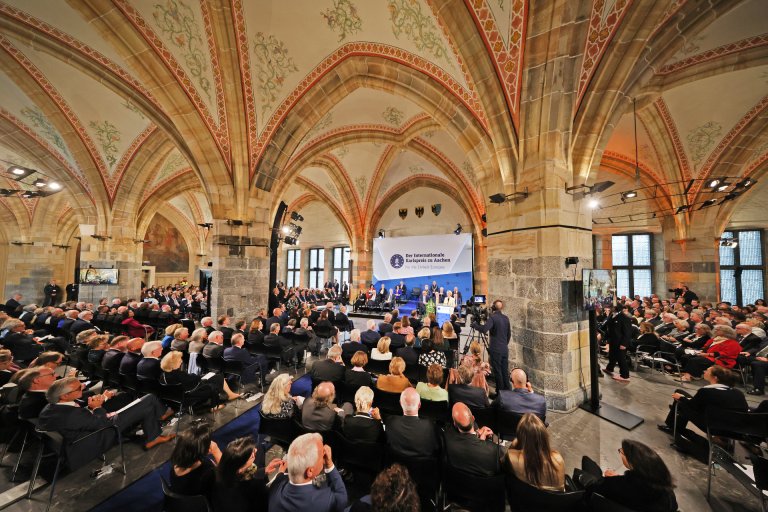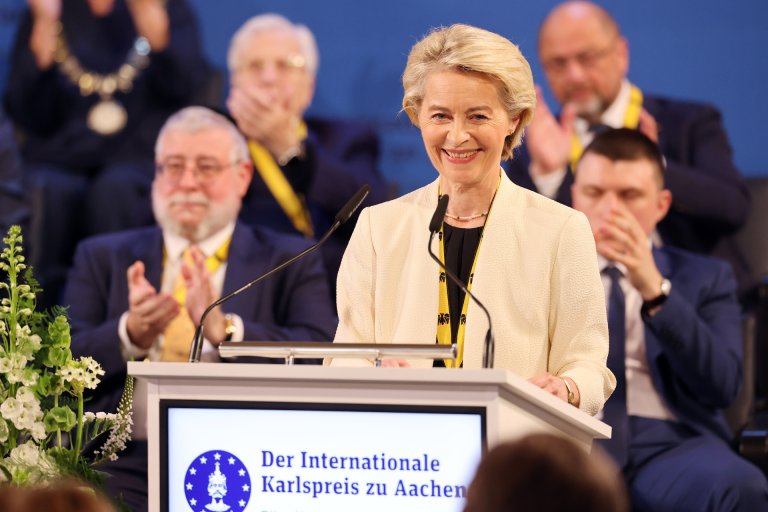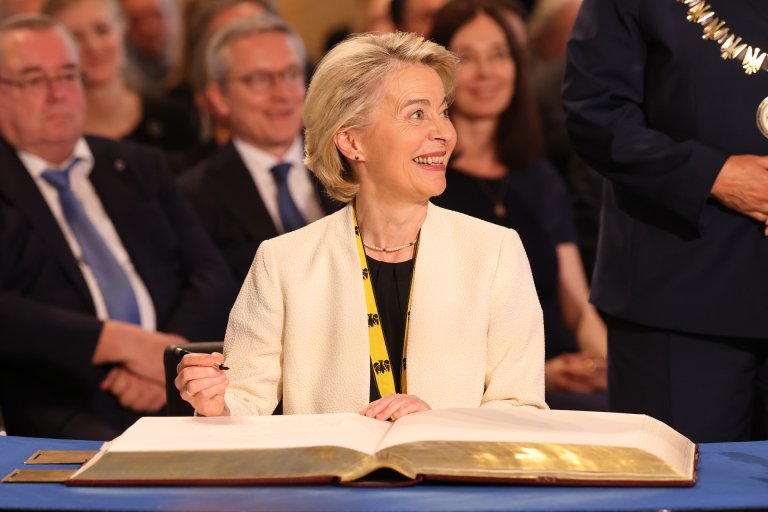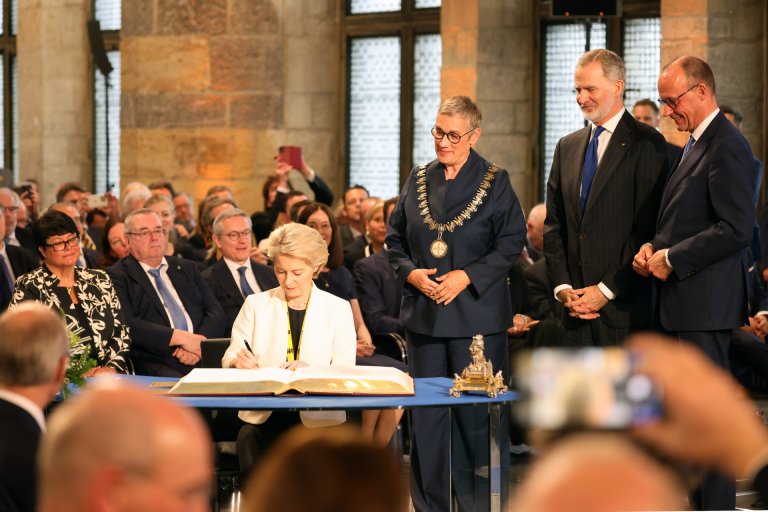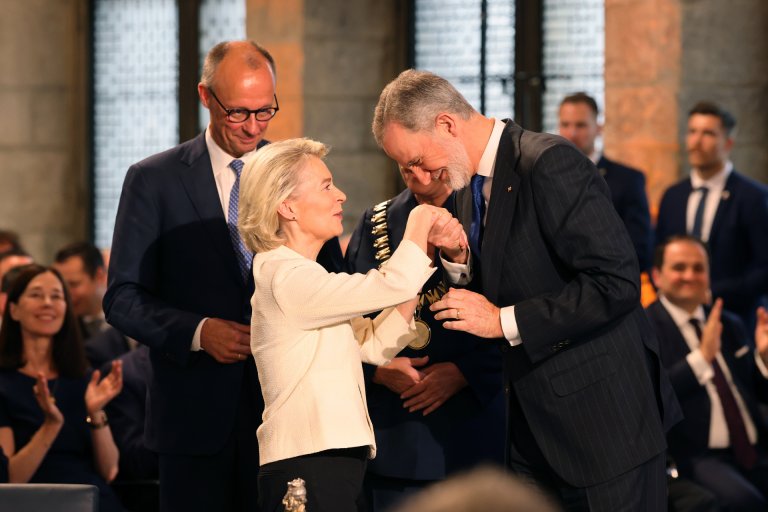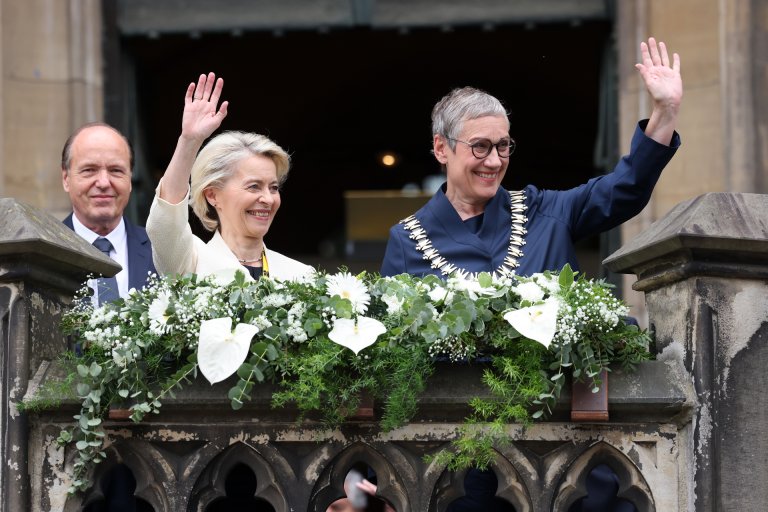"Europe is my life!" The President of the European Commission, Ursula von der Leyen, is awarded the Charlemagne Prize
- Defending democracy and freedom in Europe and defying threats to the community together. These were the core themes of this year's Charlemagne Prize ceremony.
- The crises as an opportunity to achieve something: "History is now calling for us to act, for Europe to stand up," said Ursula von der Leyen. She outlined the project of an independent Europe.
- 700 guests attend the ceremony in the Coronation Hall of Aachen City Hall, with many visitors cheering on the new Charlemagne Prize winner after the ceremony and during her subsequent performance on the Katschhof.
The award of the International Charlemagne Prize of Aachen, which Ursula von der Leyen received today, Ascension Day, May 29, was held under special auspices. The acute and ongoing threats to the European community - from crises, war, climate change, aggression and disinformation from within and without - were a recurring theme throughout the award ceremony, the events and discussions surrounding it. At the same time, however, there was also talk of the resulting opportunities, new beginnings and responsibility. The tenor: only together can the great challenges be overcome, democracy and freedom in Europe be preserved and defended. Only an independent, united Europe of strength can emerge from the crises stronger in democratic, economic and diplomatic terms.
The evening before, at "Charlemagne Prize LIVE" on the stage at the Katschhof, the then still designated Charlemagne Prize winner made it clear that Europe is currently experiencing difficult times and has to overcome many crises, while "the international order has become more of a disorder. But, and this is the important thing: it is also a great opportunity. What matters now is Europe. History is now calling for us to act, for Europe to stand up," said von der Leyen to the crowd at the Katschhof, giving a foretaste of the key points of her very personal speech on Thursday, in which she also emphasized Aachen's important European heritage.
Ursula von der Leyen: Democracy must be filled with life every day
"Europe is my life. And it is the greatest honor of my life to stand here before you all today," said the newly crowned laureate as she stepped up to the lectern in the Coronation Hall. "This prize and this city are the symbol of a united Europe. So much in Aachen bears witness to our culture and history. The miracle of Europe - the reunification of peoples, history and destiny - is enshrined in this city."
The prizewinner spoke of three important monuments in Aachen that bear witness to the history and significance of Europe. Firstly, Aachen Cathedral, "a unique testimony to the intellectual, cultural and political renaissance of Europe, initiated by Charlemagne's vision. His idea for Europe was to create a space in which science and culture, education and the rule of law could flourish."
As a second location, von der Leyen chose the old synagogue destroyed by the National Socialists and built a bridge to Edith Holländer from Aachen and her daughter Anne Frank, whose statement still impresses today: "And yet, when I look up to the sky, I think that everything will turn out well again, that this hardship will also end, that peace and tranquillity will return to the world order. In the meantime, I have to uphold my ideals; in the times that are coming, they may yet have to be carried out." For von der Leyen, the new synagogue in Aachen is "a symbol of rebirth, but also of remembrance. A painful reminder to Europe to be vigilant and unyielding in the face of all those who sow hatred and want to divide our society. We must never go down this path again." She sees Anne Frank's words as "a lesson in humanity. A duty never to forget and a mission to create a society in which every child can realize their dreams and ideals. That's what Europe means to me too."
The third place von der Leyen mentioned was Aachen City Hall, where the European pioneer Richard Coudenhove-Kalergi was awarded the Charlemagne Prize 75 years ago. "He also had a vision for Europe: a Europe in which people come together thanks to shared culture and values, freedom and respect for human dignity," said von der Leyen.
Longing for renewal and new beginnings
Von der Leyen chose these three Aachen symbols because they "say what it means to be European. And what that means for our future. They show us that our history, which is as cruel as it is great, binds us together. As Europeans. As generations." At the same time, the prizewinner also sees a longing for renewal and new beginnings. "It is time for Europe to stand up again and realize the next great European project," she said, picking up on what she had said the previous evening and emphasizing that this unifying project must come from an independent Europe.
Europe cannot stand idly by and watch the upheavals, said von der Leyen. She called for us not to fall into the false misconception that the storm would simply pass and warned that Europe was faced with a fundamental decision: "Do we wait and see and only react to the immediate crisis? Do we accept a supposed fate? Or do we take matters into our own hands and decide our own future?" It is necessary to "throw off our shackles" in order to build an independent Europe.
Ursula von der Leyen places this independent Europe on four central pillars: The development of a new form of a 21st century Pax Europaea, a focus on innovation and competitiveness, increased work on the next historic reunification of the continent, and as a fundamental, underpinning task: to renew and strengthen democracy in Europe. "We are all aware that our democracies are under attack - by adversaries from the outside acting with united forces, but also by attempts to undermine them from within. We must fight against these threats and tendencies." For the prizewinner, this also includes understanding the concerns and fears of the population. "You can't achieve democracy once and for all. You have to breathe life into it every day." Those responsible must be drivers of change. "Only if we show that democracy works for people, that it delivers, only then can we create a stronger Union. Europe can only do well if democracy is doing well. That must be our incentive, that must be our obligation."
And she demands: "We are Europeans. This empathy, this solidarity, this culture. It is up to us to make this our independent Europe. I feel incredibly honored to receive this Charlemagne Prize. Long live Europe."
King Felipe VI: Challenges can only be overcome together
In his speech, the Spanish King Felipe VI, patron of the International Charlemagne Prize of Aachen, looked back six years to when he had warned in the same place that some had given up on the European dream and turned their backs on the world for fear of an uncertain future. He referred to the voices that are currently trying to exploit these uncertainties in order to further question the integration of the EU. "We must counter these voices," demanded Felipe VI.
The dangerous and misguided ideas that Europeans would be more independent and sovereign if they lived separately in national communities could not be more wrong. "If you look at the major challenges we face, it should be clear to everyone that we can only overcome them together, as President von der Leyen has repeatedly emphasized. This applies to the areas of security, economy and diplomacy." He is certain that the international community is calling for more Europe. "Now really is the time for Europe. Not for a more 'Eurocentric' view of the world, but for a greater, honest and more respectful contribution of our actions and values to a better world."
He sees Ursula von der Leyen as "the embodiment of the European spirit and therefore a more than worthy recipient of this prize. She has overcome very important crises for Europe with great success and by promoting unity." Felipe VI also gave the laureate a mission: "I hope that this award will give further impetus to the European spirit that has inspired her actions in the past; may she find ways to strengthen our common project at every opportunity."
Several times during his speech, the King of Spain borrowed the words of the President of the Commission and concluded by quoting: "'Europe must choose its best option: the Union." These words are not my own. They are hers, and we share them wholeheartedly and with conviction. Because we see strength in unity. In solidarity, a future. So their voice becomes ours."
Merz: Freedom and democracy are worth standing up for
It was not to be the last time that Ursula von der Leyen's words were used to reinforce important European messages. "Our Europe was created to serve the people," Federal Chancellor Friedrich Merz repeated her words. The prizewinner and he himself were born into this Europe of freedom and peace. "We both see this legacy as a historical duty. The duty to preserve this Europe, a Europe that serves the people. A Europe in which we can live in self-determination, freedom and democracy," said Merz.
But what does Europe stand for and what do Europeans defend together? "We in Europe stand for what we - over centuries, through countless setbacks and disasters - have conceived, developed, won and fought for together, namely the conviction that Freedom and democracy are worth standing up for with determination and, if necessary, fighting to preserve them." What unites us in Europe is the realization that every human being is endowed with dignity, "a dignity that is inviolable and whose protection is entrusted to us all. That is the idea of Europe. But if you look around the world, you can see it: This idea is under threat."
The Federal Chancellor promised: "We will not stand on the sidelines when it comes to preserving and strengthening freedom and democracy, the rule of law and human dignity on our continent."
Merz already sees a new "spirit of unity" between the states, led by Charlemagne Prize winner Ursula von der Leyen, as a "strong representative of a strong Europe" who gives Europe a voice in the world: "A European voice. For this, you are being honored with the Charlemagne Prize today."
Mayor Keupen: The world can rely on Europe
In her speech, Lord Mayor Sibylle Keupen emphasized the Charlemagne Prize's 75-year tradition and its importance in contemporary Europe: "From a visionary - and, given the circumstances in post-war Germany, quite extraordinary - idea, the Charlemagne Prize has itself become an internationally recognized institution over the course of time that stands for the European idea like no other. Many of the prizewinners have had a significant influence on world affairs over the past 75 years. Or, like our current laureate, they continue to do so. We can therefore say that the founding fathers' plan has worked out perfectly."
And how important such pro-European forces that are committed and take responsibility still are becomes all too clear when "looking at the current world situation, unfortunately." Keupen issued a clear warning not to allow this pro-European plan to be jeopardized from outside or within, to be vigilant "that history does not repeat itself again. We must work together to ensure that we keep reminding ourselves and future generations how important and valuable cohesion is in Europe and throughout the world."
She praised Ursula von der Leyen for not allowing herself to be intimidated by forces focused on individual national interests and for building bridges, "bundling democratic forces and uniting them behind her. Your statement 'The center holds' is not just a mere statement and a confirmation of your work. It is also to your credit. Thanks to you, the world can still rely on Europe."
Closing ceremony at the Katschhof
Together with many guests of honor and former award winners, a cheering crowd welcomed the Charlemagne Prize winner at the Katschhof. Here, Ursula von der Leyen reaffirmed her statements from the previous day and from the award ceremony, her declaration of love for Europe and Aachen: "Europe is my life." And to be awarded in Aachen - "this great city, the heart of Europe" - was the greatest honor of her life. The fact that the Charlemagne Prize is an award from the people of Aachen makes her all the prouder. At the same time, she reminded them of the duty associated with it: "If you don't take care of love, then it will be lost. We have to take care of this Europe, this Europe is great, we love it. But if this love is to be strong and lasting, we have to do something for it every day. Especially for democracy in Europe." The Aachen audience responded with great applause.
Statement by the Charlemagne Prize Board of Directors
The Executive Board's explanatory memorandum states, among other things: "The European Union is facing historic challenges: geopolitical threats, economic change, climate protection and digital transformation. As President of the European Commission, Ursula von der Leyen has made a significant contribution to keeping Europe united, resilient and able to act." Whether in the pandemic, in dealing with the Russian war of aggression or in strengthening the European economy - with determination and strategic vision, the Commission President has represented Europe's interests and set a decisive course for the future. The Charlemagne Prize Board of Directors honors Ursula von der Leyen for "her outstanding commitment to European unity, security and competitiveness."
Quotes and facts in brief:
- The laureate: The President of the European Commission, Dr. Ursula von der Leyen, has been awarded the "International Charlemagne Prize of Aachen" on Ascension Day, 29 May. "Thanks to von der Leyen and her skilful diplomatic actions, Europe has been able to push opponents, doubters and sceptics into the minority," emphasized the Charlemagne Prize Board of Directors with its Chairman Dr. Jürgen Linden in its citation.
- von der Leyen's vision: "A new international order will emerge before the end of this decade. If we do not want to simply accept the consequences that this will have for Europe and the world, then we must shape this new order. History does not forgive hesitation and procrastination. Our mission is European independence."
- Federal Chancellor Friedrich Merz: "In these days, weeks and months, we are deciding the future of our continent together. We - very concretely. Because history doesn't just happen. Politics is made by people. And history emerges from political decisions. I am firmly convinced that we have every opportunity in our hands to ensure that the future of Europe is a good future for us all."
- King Felipe VI of Spain: "Europe will only be strong if it stands together. To return to the words of President von der Leyen: We will only be able to deter aggression and defend ourselves if we work together."
- Aachen's Lord Mayor Sibylle Keupen: "If war is being waged in Europe, if the reception of refugees becomes the number one domestic political issue despite a successful European agreement, if right-wing extremists gain more and more support and nationalist slogans are (made) acceptable again, if our common values are not only called into question in global politics, but also if national interests repeatedly jeopardize the peace project that the EU has always been and continues to be, then we should all be vigilant that history does not repeat itself once again."
- The award ceremony: Around 700 people, including numerous guests of honor, elected officials, ambassadors and representatives of churches and religious communities, attended the ceremony in the Coronation Hall of Aachen City Hall. Alongside Charlemagne Prize winner Ursula von der Leyen, Chancellor Friedrich Merz, King Felipe VI of Spain, the Lord Mayor of the City of Aachen Sibylle Keupen, the Chairman of the Charlemagne Prize Board of Directors Dr. Jürgen Linden, representatives of the Charlemagne Prize Foundation and the German Federal Chancellery sat on the podium of honor. Jürgen Linden, representatives of this year's Youth Charlemagne Prize winners, the former Charlemagne Prize winners Dahlia Grybauskaité (2013), Jean-Claude Trichet (2011) and Martin Schulz (2015) as well as the 2022 prizewinners Veronica Tsepkalo, Svetlana Tikhanovskaya and - on behalf of her imprisoned sister Maria Kalesnikava - Tatsiana Khomich.
- Other guests: Among the guests at the Charlemagne Prize ceremony were Robert Abela, Prime Minister of Malta, Luc Frieden, Prime Minister of the Grand Duchy of Luxembourg, Edi Rama, Prime Minister of Albania, Gunther Krichbaum, Minister of State for Europe at the Federal Foreign Office, Hendrik Wüst, Prime Minister of North Rhine-Westphalia, the NRW ministers Nathanael Liminski, Mona Neubaur and Herbert Reul. Dr. Josef Schuster, President of the Central Council of Jews in Germany, was also a guest of honour at the Charlemagne Prize ceremony.
- The program: The Charlemagne Prize ceremony was musically accompanied by the Aachen Symphony Orchestra, which performed works by Wolfgang Amadeus Mozart and Anno Schreier under the direction of General Music Director Christopher Ward. Claudia Muschio performed as a soprano.
- The media interest: More than 100 media representatives have been accredited for the Charlemagne Prize Ceremony 2025 - including teams from ARD, ZDF and WDR, POLITICO, Reuters news agency, Television Espanola, Süddeutsche Zeitung, FAZ, efe press agency, DPA, Deutsche Welle, Funke-Mediengruppe, BILD, Euractiv, Börsen-Zeitung, AFP, Spiegel, as well as numerous regional media from Germany, Belgium and the Netherlands. The live TV broadcast was shown on WDR television and is still available there.
Information on the International Charlemagne Prize of Aachen:
The International Charlemagne Prize of Aachen is considered one of the most important European prizes. Since 1950, it has been awarded to individuals and institutions that have rendered outstanding services to the unification of Europe. Chief Rabbi Pinchas Goldschmidt and the Jewish communities in Europe are the 65th recipients of the International Charlemagne Prize of Aachen. They follow the President of Ukraine, Volodymyr Selenskyj, and the Ukrainian people, who were awarded the Charlemagne Prize in 2023. Previous laureates in Aachen have included Konrad Adenauer (1954), the Spanish King Juan Carlos I. (1982), US President Bill Clinton (2000), Luxembourg Prime Minister Jean-Claude Juncker (2006), German Chancellor Angela Merkel (2008), Pope Francis (2016), French President Emmanuel Macron (2018), António Guterres, Secretary-General of the United Nations (2019), Belarusian civil rights activists Maria Kalesnikava, Svetlana Tikhanovskaya and Veronica Tsepkalo (2022), Ukrainian President Volodymyr Zelensky and the Ukrainian people (2023) and Chief Rabbi Pinchas Goldschmidt (2024).
As part of the festive ceremony in the historic Coronation Hall of Aachen City Hall, a medal is awarded in addition to a certificate, which shows the oldest Aachen city seal from the 12th century with Charlemagne enthroned on the front and an inscription for the respective award winners on the back.
Further information:
You can subscribe to our RSS feed for our press releases here https://www.aachen.de/rss-feed-pressemitteilungen/rss.xml
